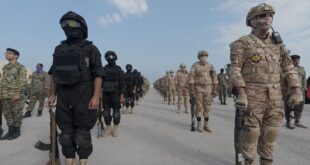 ISLAMABAD (Reuters) – Pakistani opposition parties haggled on Thursday over whether to demand reinstatement of judges sacked by President Pervez Musharraf as a condition for their participation in January elections.
ISLAMABAD (Reuters) – Pakistani opposition parties haggled on Thursday over whether to demand reinstatement of judges sacked by President Pervez Musharraf as a condition for their participation in January elections.
Two former prime ministers, Benazir Bhutto and Nawaz Sharif, have said they would present Musharraf with a “charter of demands” to ensure a fair general election on January 8, failing which they would “move towards” a boycott.
A boycott by the two main opposition parties and smaller allies would rob the vote of credibility and prolong instability in a nuclear-armed country that is crucial to U.S. efforts to fight al Qaeda and bring peace to neighboring Afghanistan.
“Most of the issues have been decided with consensus. The remaining issues will be decided today. Today is the final sitting, we’re going to finalize our list,” said Ahsan Iqbal, a spokesman for Sharif’s party, involved in drafting the demands.
Iqbal declined to give details but other opposition officials said the two parties still differed over whether to demand the restoration of 37 judges dismissed by Musharraf after he imposed emergency rule on November 3.
Bhutto says the new parliament should decide on the fate of the judges. Sharif, who has been visiting parts of the north of the country this week to meet supporters, has called for an election boycott unless the judges are reinstated.
“There is no question of compromise on this issue. We are saying it should be before the election. The PPP says it should be after the election,” said Javed Hashmi, a senior official in Sharif’s party, referring to Bhutto’s Pakistan People’s Party.
ONLY STUMBLING BLOCK
“This is the only thing where we have to this time not been able to agree,” Hashmi said.
Bhutto has said her party would reluctantly take part in the vote, while reserving the right to withdraw or to protest against an unfair result. She has already issued a manifesto and effectively began her campaign last weekend.
Despite his doubts about the election, Sharif registered to run but his nomination was rejected on Monday because of criminal convictions that Sharif says were politically motivated.
Bhutto returned from eight years of self-exile in October. Sharif, ousted by Musharraf in 1999 and sent into exile the following year, came home on November 25.
Musharraf stepped down as army chief last week and was sworn in as civilian president. He also promised that emergency rule would be lifted on December 16, fulfilling two main demands of his rivals and his Western backers.
But Musharraf has ruled out reinstating the judges, some of whom remain under house arrest, including former Supreme Court chief justice Iftikhar Chaudhry. Musharraf has been at odds with the judiciary since he tried to sack Chaudhry in March.
Critics say Musharraf’s main motive for imposing emergency rule was to purge the judiciary of hostile judges, including Chaudhry, amid fears they were about to rule unconstitutional his October 6 re-election by legislators.
BLOCKED BY POLICE
Sharif tried to meet Chaudhry at his Islamabad home on Thursday but was blocked by police. Dozens of Sharif supporters chanted anti-Musharraf slogans and tore down and stamped on a poster of the president.
Scores of lawyers opposed to the government had earlier tried to approach Chaudhry’s home while hundreds of lawyers clashed with police in the southeastern city of Multan.
Bhutto has accused the government of planning to rig the election in favor of pro-Musharraf candidates, and has called for a reconstitution of the Election Commission.
She has also questioned the neutrality of a caretaker government, made up mostly of Musharraf supporters, which was installed last month to oversee the election.
Analysts expect both main opposition parties to eventually take part after extracting maximum concessions.
“They are trying to exert maximum pressure on the government to get an even playing field,” said Talat Masood, a former general turned analyst.
 Eurasia Press & News
Eurasia Press & News



